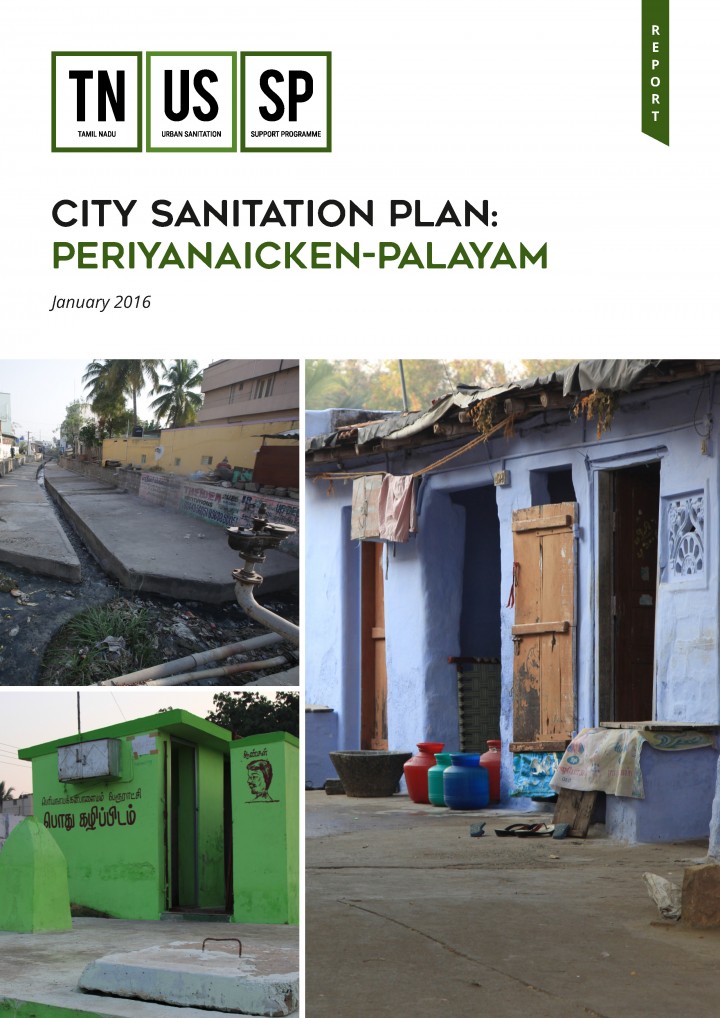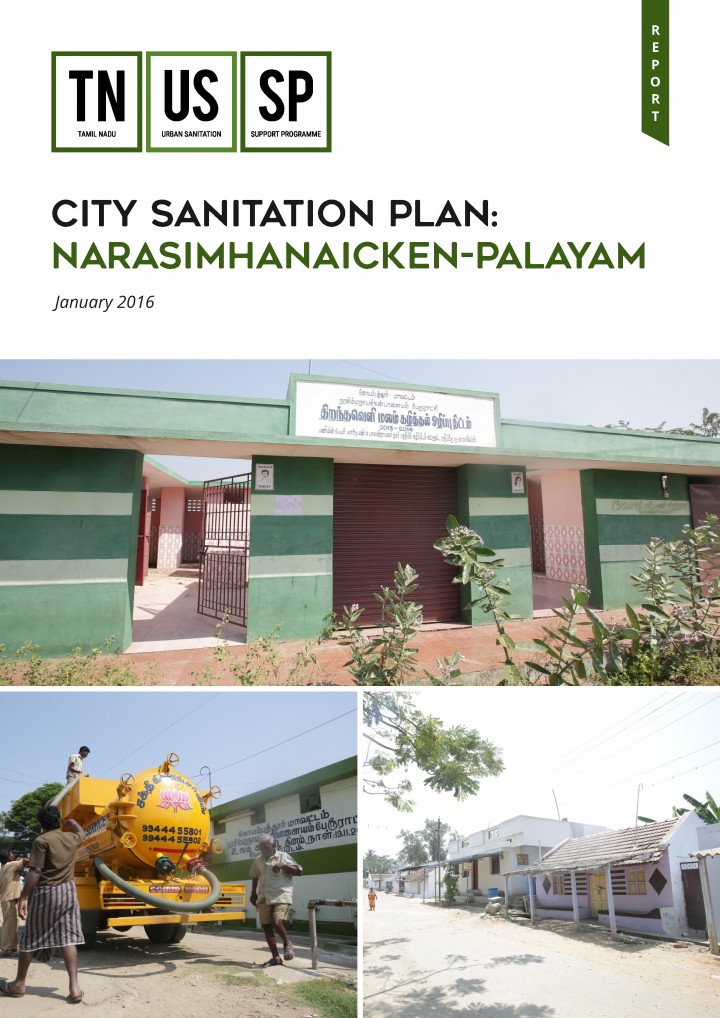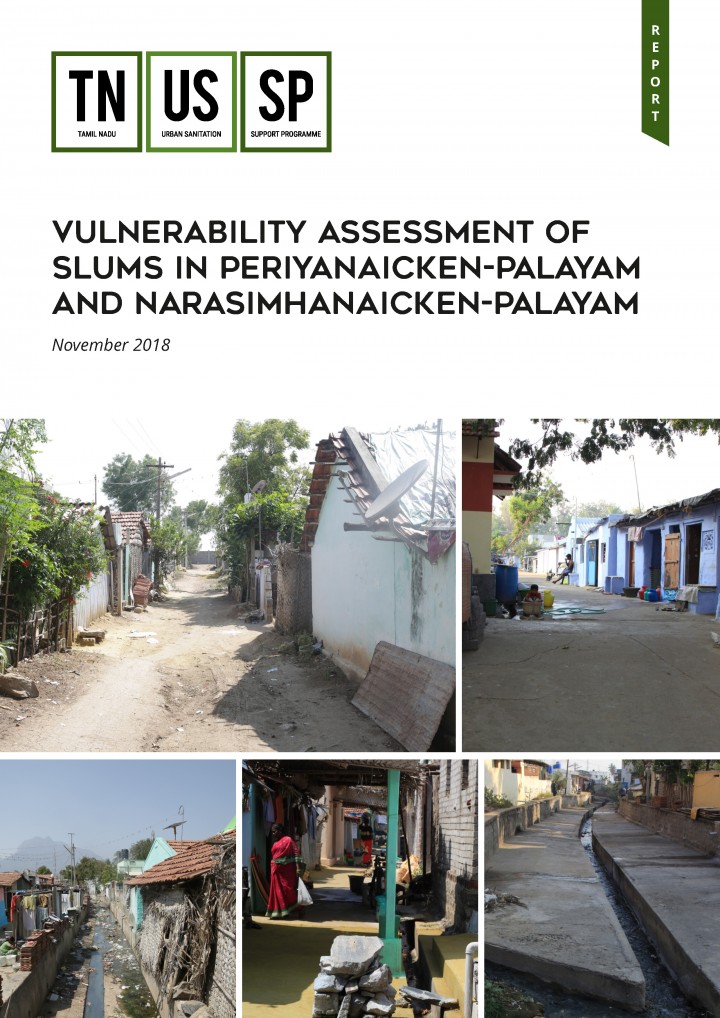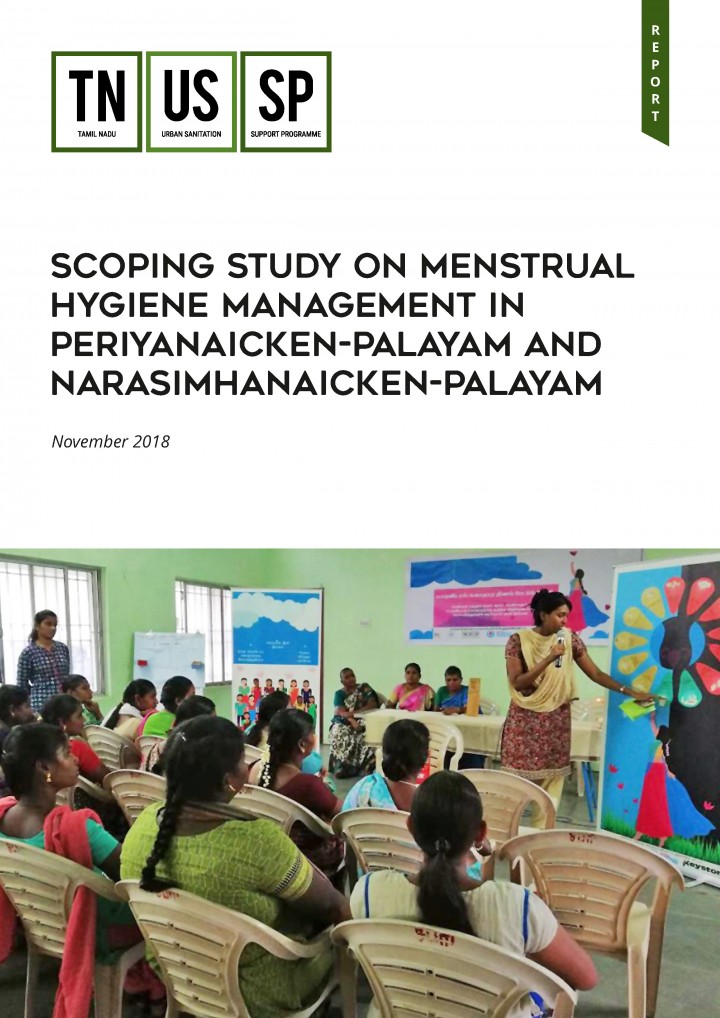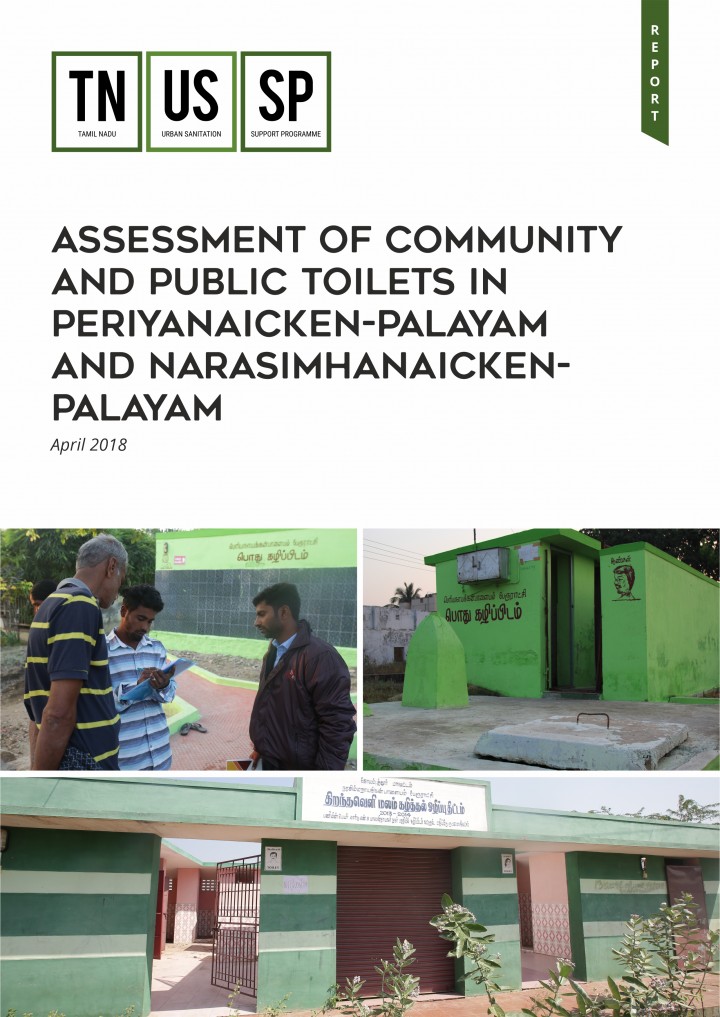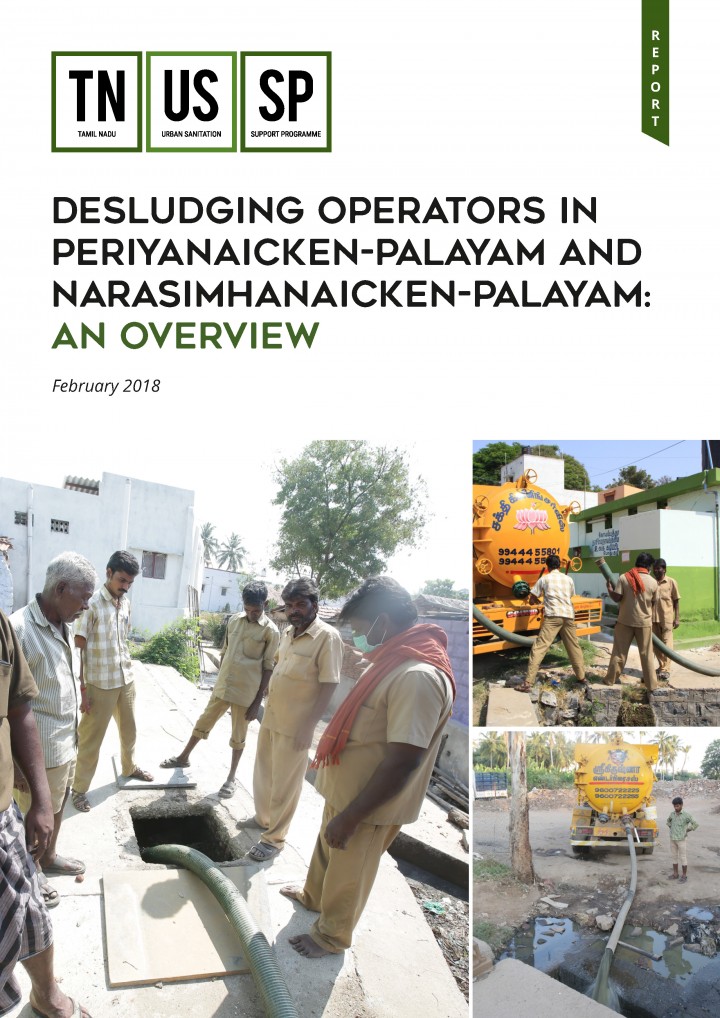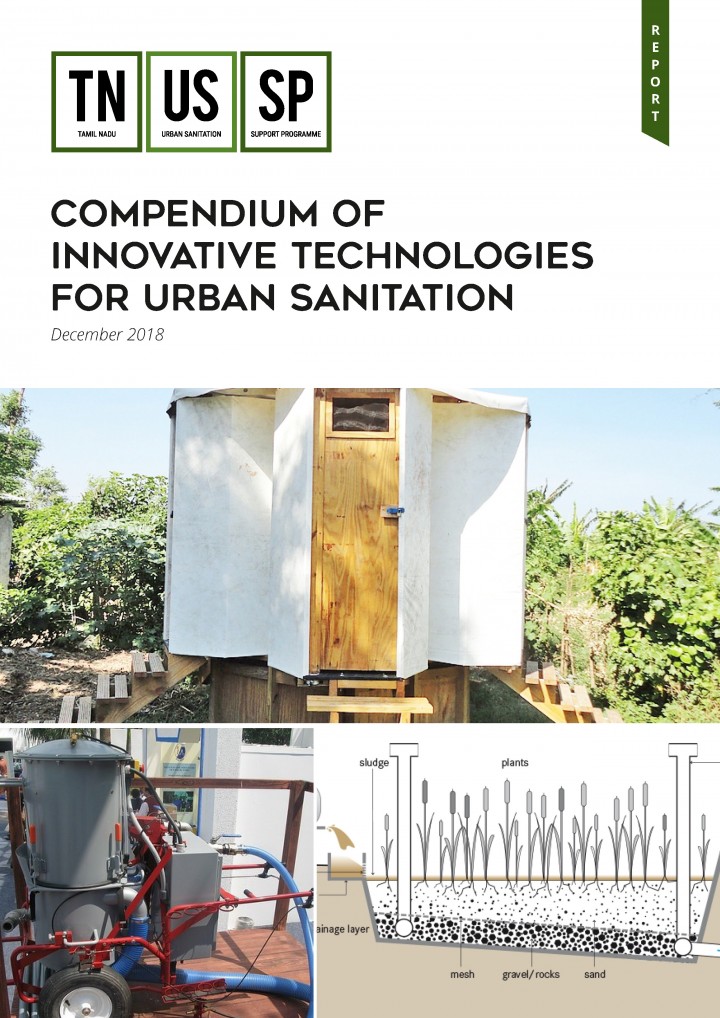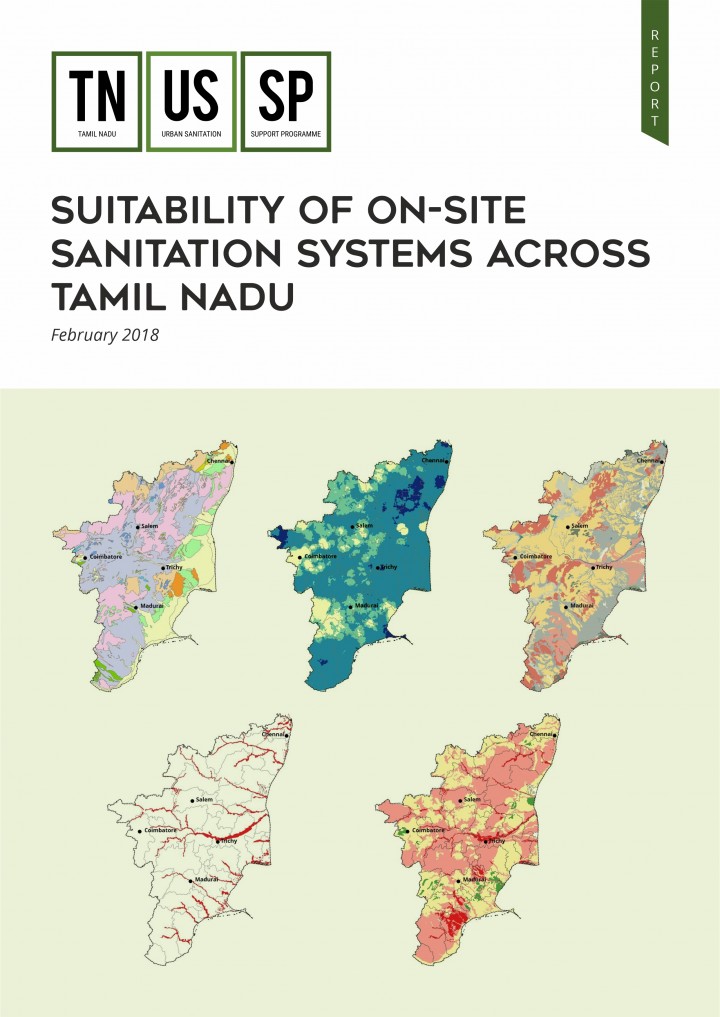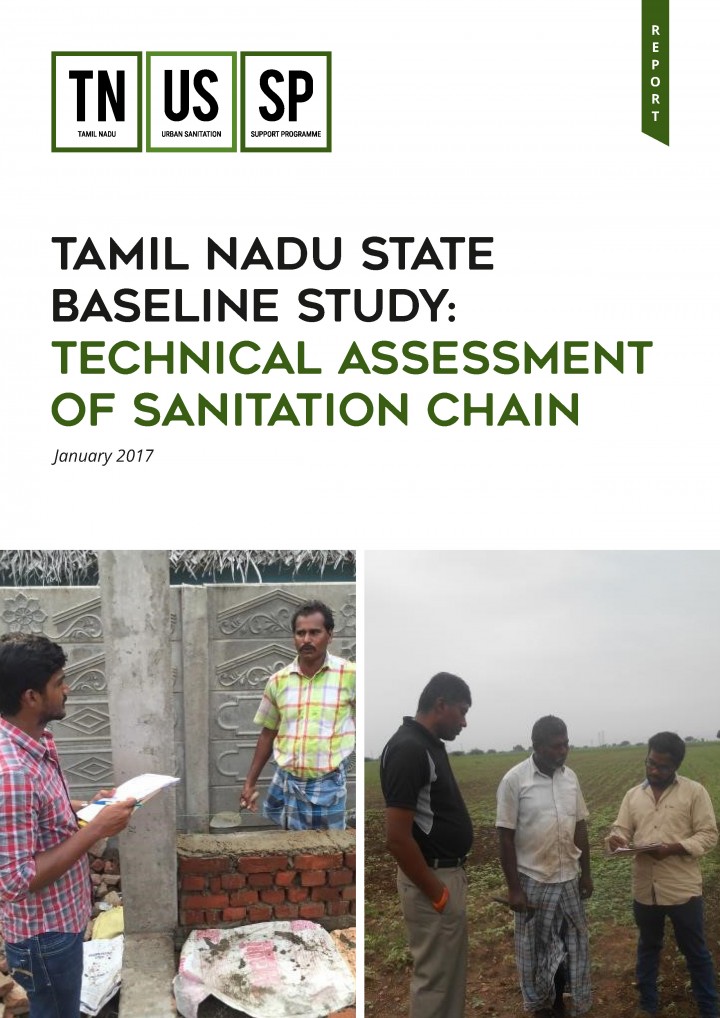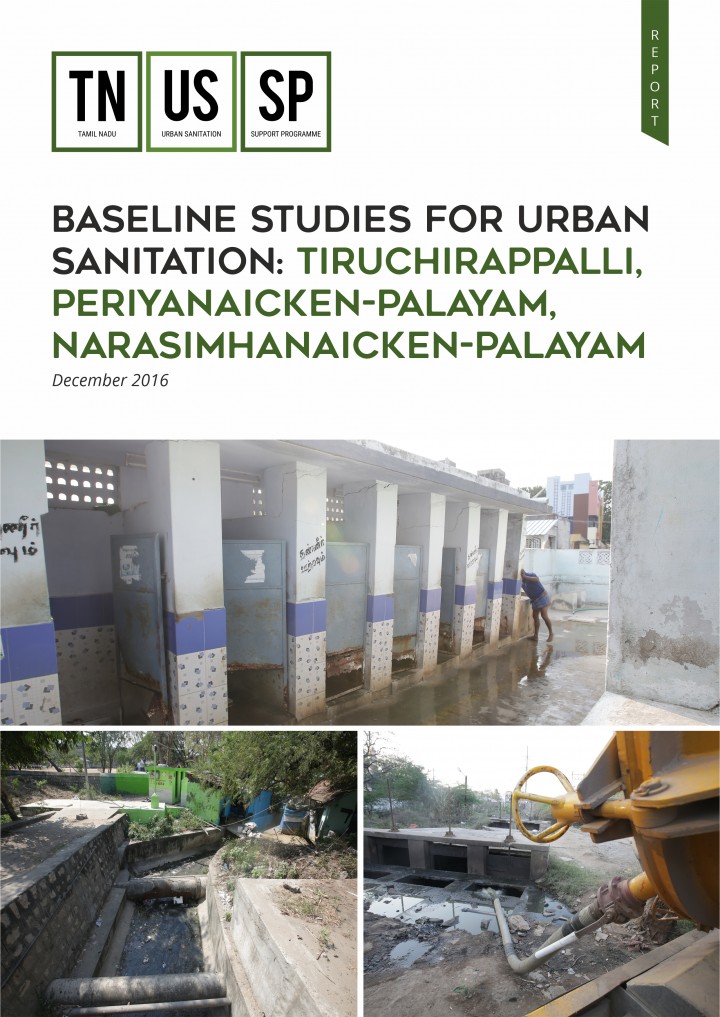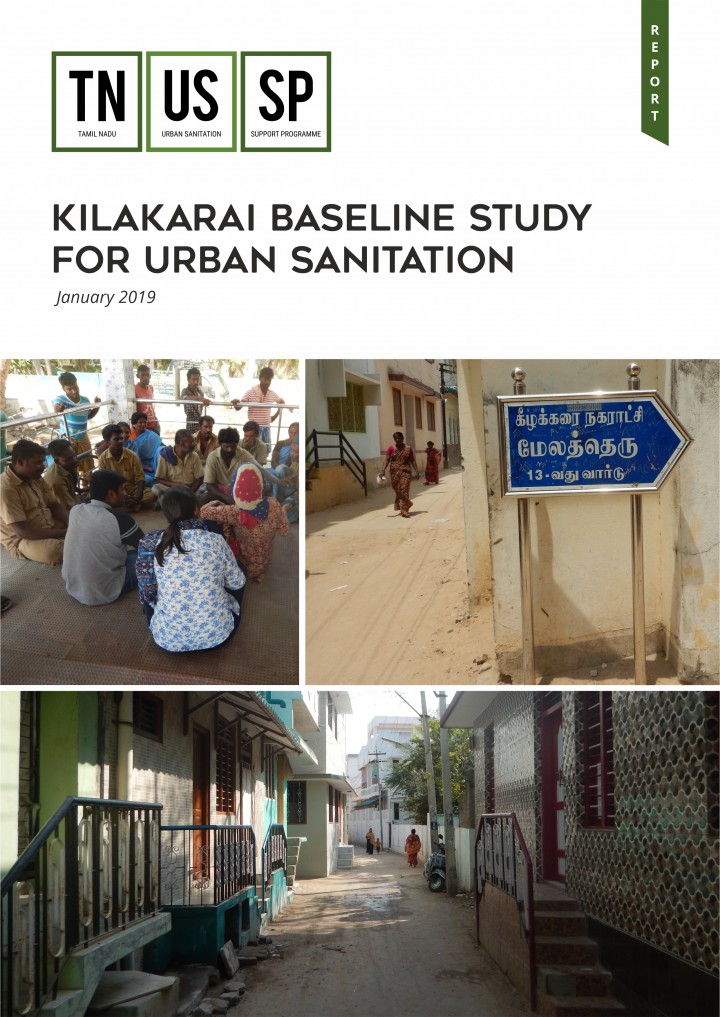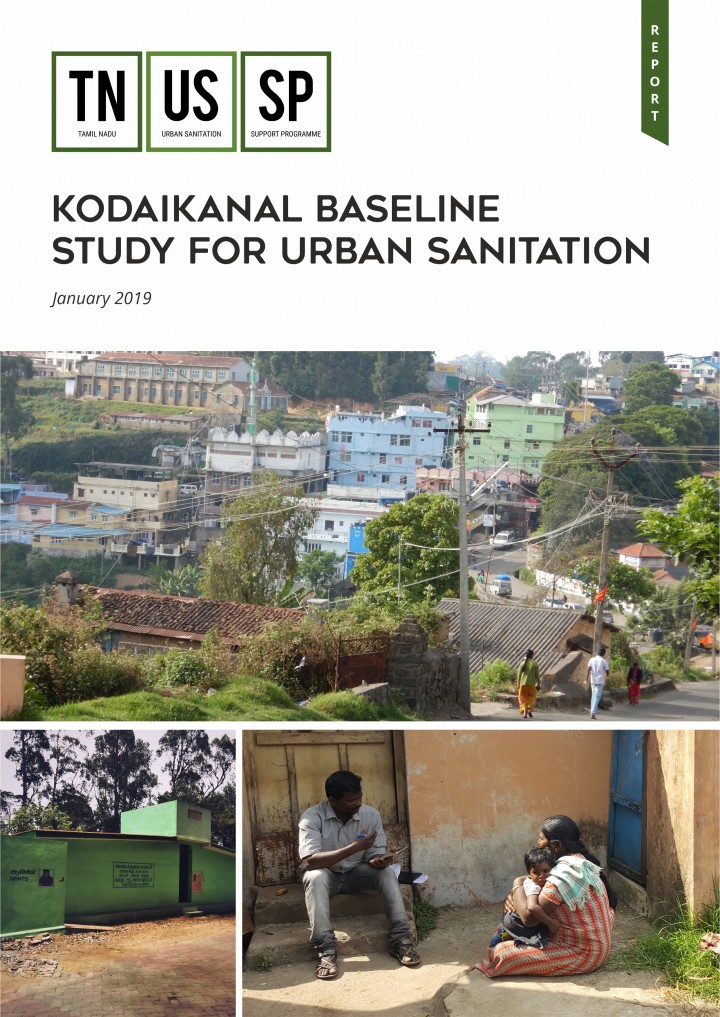TNUSSP (2016) City Sanitation Plan: Periyanaicken-Palayam
The current document presents the City Sanitation Plan for PNP. PNP is one of the cluster towns selected for implementing fecal sludge management in Tamil Nadu. This plan is curated from the sanitation situation analysis which included identifying major components of sanitation (water supply, storm water drainage and solid waste management), issues related to it, and possible solutions.
TNUSSP (2016) City Sanitation Plan: Narasimhanaicken-Palayam
This document presents the City Sanitation Plan for NNP. NNP is one of the cluster towns selected for implementing fecal sludge management in Tamil Nadu. This plan is curated from the sanitation situation analysis, which included identifying major components of sanitation (water supply, storm water drainage and solid waste management), and analysing related issues and possible solutions.
TNUSSP (2018) Vulnerability Assessment of Slums in Periyanaicken-Palayam and Narasimhanaicken-Palayam
To understand the vulnerability of the slums, all eleven slums in the town panchayats of Periyanaicken Palayam and Narasimhanaicken Palayam in Coimbatore were profiled using a range of indicators including location, migration, housing, water, sanitation, drainage, electricity, demography, and health seeking among others. This assessment helped categorise and prioritise slums in terms of their vulnerability, and to design and implement programmes for their improvement.
TNUSSP (2018) Scoping Study on Menstrual Hygiene Management in Periyanaicken-Palayam and Narasimhanaicken-Palayam
Improper disposal of menstrual waste is a noteworthy challenge when it comes to Menstrual Hygiene Management (MHM). Polymeric sanitary napkins, which have largely replaced cloth napkins, are made of material that is non-biodegradable, leading to the accumulation of used napkins in landfills. Accumulated menstrual waste can be hazardous because menstrual blood on napkins stagnates for a long time allowing pathogens such as Escherichia coli (E-coli) […]
TNUSSP (2018) Assessment of Community and Public Toilets in Periyanaicken-Palayam and Narasimhanaicken-Palayam
TNUSSP carried an assessment of Community Toilets and Public Toilets facilities in the two town panchayats Periyanaicken-Palayam and Narasimhanaicken-Palayam in Coimbatore district. The assessment aimed to profile the facilities in terms of their existing infrastructure, waste and waste management, and operation and maintenance practices. Further, toilet usage patterns were analysed and exit interviews with facility users for their feedback was undertaken. Community of user and […]
TNUSSP (2018) Desludging Operators in Periyanaicken-Palayam and Narasimhanaicken-Palayam: An Overview
Safe collection and safe disposal of fecal sludge is a critical component of septage management in which desludging operators play a central role. In order to understand their work, consultations were conducted with desludging operators in the Periyanaicken Palayam and Narasimhanaicken Palayam town panchayats of Coimbatore district. These consultations aimed to understand the current desludging practices, the different kinds of business models and the overall […]
TNUSSP (2018) Compendium of Innovative Technologies for Urban Sanitation
This is a Compendium of technology options for various components in the urban sanitation chain. This Compendium is contextual to the geographic and economic conditions for the state of Tamil Nadu and aims to provide the user with a broad range of innovative sanitation systems and technologies that can be implemented on the ground. This document is designed to act as a reference guide and […]
TNUSSP (2018) Suitability of On-site Sanitation Systems across Tamil Nadu
On-site sanitation systems (OSS) remain the dominant household arrangement across the state of Tamil Nadu for urban sanitation. Given that these OSS are spread over different hydrogeological zones, factors such as aquifer systems, soil drainage characteristics, groundwater levels and flood hazard areas have a bearing on their suitability. A study was undertaken for the state of Tamil Nadu to understand how these factors collectively determine […]
TNUSSP (2017) Tamil Nadu State Baseline Study: Technical Assessment of Sanitation Chain
TNUSSP carried out a baseline study in 36 ULBs across seven different agro- climatic zones to develop an understanding of the sanitation situation across the various region in the State of Tamil Nadu. The study used both quantitative and qualitative data collection methods to elicit information from various stakeholders including household members, masons, public toilet and community toilet operators, desludging operators, treatment facility operators and […]
TNUSSP (2016) Baseline Studies for Urban Sanitation: Tiruchirappalli, Periyanaicken-Palayam, Narasimhanaicken-Palayam
TNUSSP carried out a baseline study in Tiruchirappalli city and the two town panchayats of Periyanaicken- Palayam and Narasimhanaicken-Palayam in Coimbatore district. The study aimed to profile households, establishments and schools in these locations in terms of their arrangement for toilets, existing containment types, collection, conveyance, and disposal mechanism along with water supply arrangements. Further, solid waste management and menstrual hygiene practices were also discussed […]
TNUSSP (2019) Kilakarai Baseline Study for Urban Sanitation
TNUSSP carried out a baseline study in Kilakarai municipality to understand the current situation of access to sanitation and arrangements made for fecal sludge management in households and establishments. The findings from the study provide an overview of the gaps and challenges across the sanitation chain in Kilakarai in effective implementation and monitoring of septage management.
TNUSSP (2019) Kodaikanal Baseline Study for Urban Sanitation
TNUSSP carried out a baseline study in Kodaikanal municipality to understand the current situation of access to sanitation and arrangements made for fecal sludge management in households and establishments. The findings from the study provide an overview of the gaps and challenges across the sanitation chain in Kodaikanal in effective implementation and monitoring of septage management.
Schertenleib, R., Lüthi, C., Panesar, A., Büürma, M., Kapur, D., Narayan, A., Pres, A., Salian, P., Spuhler, D., Tempel, A. (2021) A Sanitation Journey Principles, Approaches & Tools for Urban Sanitation
Sanitation and hygiene are the foundation of healthy cities. They are a primary prerequisite for the health of our societies as well as economic development. However, achieving safe and sustainable urban sanitation for all has proven to be difficult, especially for the vulnerable and poor. The publication "A Sanitation Journey - Principles, Approaches and Tools for Urban Sanitation" provides an orientation to the sector’s current status […]
Various Authors (2021) Methods for Faecal Sludge Analysis
Faecal sludge management is recognized globally as an essential component of city-wide inclusive sanitation. However, a major gap in developing appropriate and adequate management and monitoring for faecal sludge is the ability to understand and predict the characteristics and volumes of accumulated faecal sludge, and correlations to source populations. Since standard methods for sampling and analysing faecal sludge do not currently exist, results are not […]
Kansakar, L. K., Shrestha, A. M., Ashorn, M., Babu, S., Ahmad, T. (2021) Evolution of the Kathmandu Valley Cholera Prevention and Preparedness Programme
Cholera outbreaks occur almost every year during the monsoon season in Nepal. The 1.3 million people living in the Kathmandu Valley are some of the most affected and vulnerable in the country. The earthquakes in 2015 caused massive population displacement and increased the potential for an outbreak as a result of the widespread destruction of water supply infrastructure and sanitation facilities. A major outbreak was […]
Parmar, T., Manchikanti, S., Arora, R. (2021) Building Back Better Kerala Addressing Post-Disaster Recovery Needs
UNICEF was part of the front-line response to the 2018 floods and their devastating consequences in the Indian State of Kerala. UNICEF’s work focussed on supporting WASH services and equipment in affected communities. UNICEF, with the support of national and regional-level administrations, local non-governmental organisations (NGOs), community-level organisations as well as national and local radio stations, set about responding to urgent WASH needs in order […]
Kugedera, Z., Ambreen, S. (2021) District-level Joint Sector Review and WASH Bottleneck Analysis Tool Lessons Learned from Jhang, Pakistan
In 2017, the Government of Pakistan rolled out Joint Sector Reviews (JSR) in four provinces in order to periodically assess the performance of the water, sanitation and hygiene (WASH) sector. UNICEF, the Government, development partners, and civil society participated in the process, using the WASH Bottleneck Analysis Tool (WASH-BAT) as a guiding framework. The WASH-BAT, which was designed by UNICEF with inputs from WASH sector […]
Haziq, H. (2021) Improved Operation and Maintenance and Revenue Collection from Metered Water Supply Systems Lessons from Rural Afghanistan
The Government of Afghanistan is investigating service delivery options to achieve access to safe and affordable drinking water (SDG Goal 6.1). One option to provide rural communities with sustainable and quality water is metered household water connections. The Afghan government began supporting such an approach in 2006 which it began to scale-up in 2016. This study documents and assesses experiences in the operation and maintenance […]
Patabendi, N., Sivakumaran, R., Abdulloeva, S. (2021) Community Involvement in Promoting Groundwater Recharge Through Managed Aquifer Recharge (MAR) Approach A Pilot Experience in Jaffna, Sri Lanka
In December 2017, the European Union Catalytic Support to Peace Building (EU-CSPB) Programme supported the rollout of a peacebuilding plan led by the Government of Sri Lanka and other partners. This programme supported a managed aquifer recharge (MAR) strategy in Jaffna to encourage the resettlement of communities after years of internal conflict. To pilot a MAR feasibility study in Jaffna, UNICEF partnered with the local […]
Various Authors (2021) COVID-19 Response and WASH Lessons Learned Afghanistan, Bangladesh, Bhutan, India, Maldives, Nepal, Pakistan, Sri Lanka
UNICEF’s water, sanitation and hygiene (WASH) country teams work inclusively with governments, civil society partners and donors, to improve WASH services for children and adolescents, and the families and caregivers who support them. UNICEF works in over 100 countries worldwide to improve water and sanitation services, as well as basic hygiene practices. This publication is part of the UNICEF WASH Learning Series, designed to contribute […]
